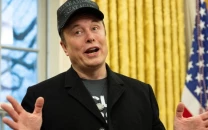US Democratic panel flags misinformation concerns to Facebook
Policy on paid political advertisements has flaws that allow the spread of false information

Facebook spokesperson says the company was proactively removing 65% of hate speech before it was reported globally. PHOTO: REUTERS
Facebook has been reviewing its policies after lawmakers and regulators criticised a decision not to fact-check ads run by politicians, with Chief Executive Mark Zuckerberg saying it does not want to stifle political speech.
In the letter that Reuters obtained on Tuesday, the US Democratic Party’s administrative and fundraising body has flagged its concerns to Sandberg, Facebook’s chief operating officer, and sought more transparency.
“...we have significant remaining concerns about Facebook policies that allow the platform to be used to spread misinformation and undermine our democracy,” the committee’s chief executive, Seema Nanda, wrote in the November 21 letter.
Facebook’s Zuckerberg says company considered banning political ads
The panel said it felt Facebook had not devoted enough resources to detecting inauthentic behavior.
“Considering Facebook’s enormous financial resources and the stakes of the upcoming elections, we’d ask that you dedicate additional capacity to enforce your terms of service against these types of malicious actors,” Nanda added.
A meeting of DNC representatives and Facebook took place last month, ahead of the 2020 US presidential primary season, the panel said.
Twitter admits phone numbers meant for security used for ads
On Wednesday, Facebook said it was in regular touch with the DNC, reviewing and taking action on any abuse it mentioned.
Facebook has also joined sessions to train campaign participants on how to share details of suspicious activity, a spokeswoman told Reuters.
The social media platform has recently faced a barrage of criticism over privacy lapses, election-related activity and its dominance in online advertising, spurring calls for more regulation and anti-trust investigations.



















COMMENTS
Comments are moderated and generally will be posted if they are on-topic and not abusive.
For more information, please see our Comments FAQ